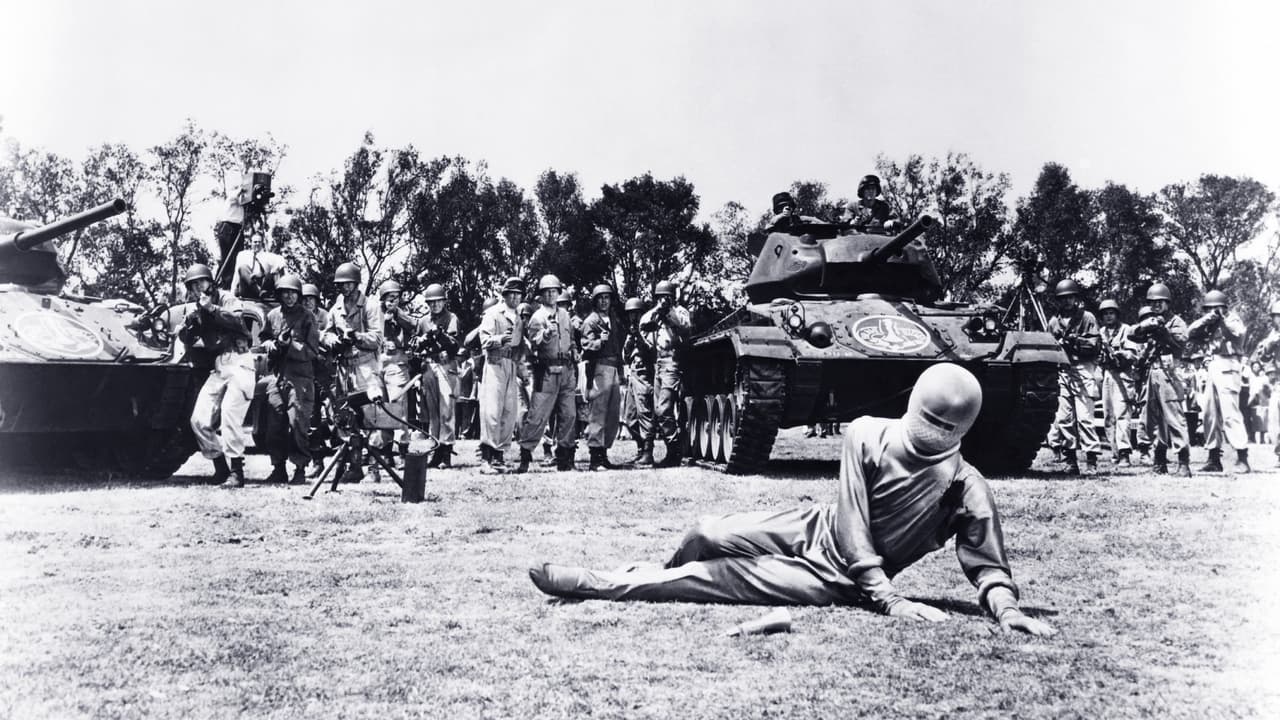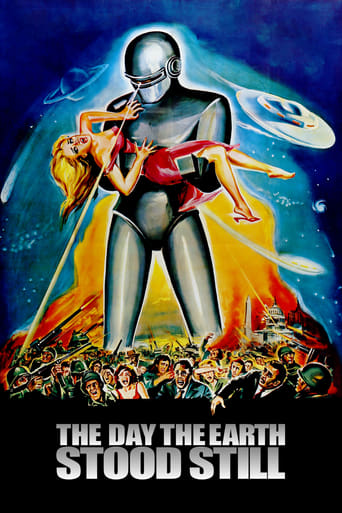

Self-important, over-dramatic, uninspired.
... View MoreIt's not great by any means, but it's a pretty good movie that didn't leave me filled with regret for investing time in it.
... View MoreExcellent characters with emotional depth. My wife, daughter and granddaughter all enjoyed it...and me, too! Very good movie! You won't be disappointed.
... View MoreThere's a more than satisfactory amount of boom-boom in the movie's trim running time.
... View MoreWithout a doubt in my mind, the original version of this story remains the greatest sci-fi themed movie about a visitor from another planet and the dangers that awaits the earth if we don't change our ways. 67 years later, this film still resonates in an even more dangerous time, with so many other powers threatening our survival as a planet and little, if no, lessons learned from the horrors of the past. This film wastes absolutely no time in introducing the visitor from outer space, a human being like creature from an unnamed planet who is shot and hospitilized simply for offering a gift which some paranoid army soldier believes to be a weapon. He shot first and never got to ask questions later, but for the visitor (the outstanding Michael Rennie), lots of questions are asked, and many lessons are learned, particularly by the sultry voiced widow Patricia Neal and her lovable son (Billy Gray) who takes a shine to the new boarder even though potential stepfather Hugh Marlowe is instantly suspicious of him.A genius of incomparable patience, charm and class, Rennie's visitor immediately impresses scientist Sam Jaffe over his ability to solve a difficult problem Jaffe had been working on in his efforts to use nuclear power for good. Jaffe, considered the wisest man on earth, looks on at Rennie in awe, seemingly immediately knowing what Rennie's mission is and determined to get the message spread for the good of all of the universe. Neal at first is conflicted. She likes her son having an older male companion, but something about Rennie to her (mostly thanks to Marlowe's paranoia) doesn't seem right. A visit to Rennie's spaceship (thanks to the most amazing encounter with the very dangerous robot Rennie reveals to be a police officer for universal safety) reveals everything to her, and Neal wakes up to her own blindness to the dangers earthlings pose to the future of the entire solar system. Most subtle in its depiction of Rennie's alien civilization as peace loving and unselfish in every way, it also presents a view of our earth society as violent, paranoid, self centered, and most importantly, unaware of the dangers we put on the solar system because of our obsessions with war and nuclear power. Blow yourself up if you so desire, Rennie tells his captive earth audience, but leave the rest of the universe alone, or face the consequences. This film never loses steam as it intensely drags the audience into its calm but intense world of a desire for the end of the violent nonsense, and shows the hypocrisies of our world which we obviously have let get too far out of control. I don't know if I could bear to see the remake of this film, because it pretty much says everything here and cannot be improved on. Perhaps this film 67 years later should be passed around to every new leader in our world as well as a reminder of past destructions that not only killed millions but brought the perpetrators down viciously as well.
... View MoreLet's send Klaatu and Gort over there to read them the riot act and then deliver a message that they will never, ever forget. Klaatu has the diplomatic skills and the charismatic looks while Gort has--well, Gort, you know, has that special ability to whip the little buggers into shape as no one in the rest of the universe can.First of all, imagine a planet without stupidity. I couldn't. What about arrogance? They might have some of that. Even Klaatu's planet couldn't possibly be perfect. No place ever is.The historical context of this 1951 science fiction classic is that the planet Earth had recently endured a devastating World War II in which an astounding 60 million people had been killed by violent means including a deliberately programmed campaign of genocide and the release of the first atomic bombs. What made matters worse was that the Korean War, which has yet to be resolved nearly seventy years later, had begun one year earlier with no end in sight and with the very real threat of turning a cold war into a very, very hot one. In order to fully appreciate this movie, it is vital to understand its historical context.The innovative electronic musical score of Bernard Hermann ("Psycho", "Vertigo", "North By Northwest", "Citizen Kane", "Taxi Driver", "The Wrong Man", etc.), Hitchcock's favorite composer, should never be underestimated here. Without it, the film would never have had its powerful impact, which survives to this day.As director, Robert Wise ("West Side Story", "The Sound of Music", "I Want to Live!", "The Sand Pebbles", etc.) must be commended for his bold originality and his captivating visual quality. Folks, this was 1951. That's almost as old as I am! Aside from all of the creative sci fi features, many of which still work today, I appreciate how he created a very authentic 1951 Washington DC atmosphere while none of the cast members were ever actually located there during the filming.The entire cast is excellent, including Patricia Neal, who always exerts 100% effort in every one of her cinematic performances and adds great value to every movie in which she ever appears, Michael Rennie, Sam Jaffe, Hugh Marlowe, and Billy Gray as Ms. Neal's very credible, likeable son. As much as he wouldn't want us to remember, Mr. Gray appeared as Bud Anderson in the extremely influential television series "Father Knows Best" for seven years from 1954 to 1960, the most malleable period of my impressionable childhood.Why would anyone waste the time and resources attempting to remake this remarkable film? I'll never understand that, and I never bothered seeing the remake. Why "on earth" would I?
... View MoreThe Day The Earth Stood Still has its glamours in music, acting, and special effects; however, its various plot holes, blatant thematic message, and poor character design stop it from the rank of classics. On the bright side, the film certainly did well in its imagination and is very bold in depicting the alien. Some of the special effects and props are not very bad. Costuming is far from convincing, but would be quite impressive considering the time. My biggest problem with it has nothing to do with tech stuffs. The story is not good. Many films, new or old, indulge themselves in conveying the theme and completely forget that they are always firstly telling a story. This film tells an okay story, but its narrative devices are naive even to that time period. This is also a good example of a film forcing its theme out. You can see how the film is trying to urge humans to give up strives, but not in a subtle way like Gone in the Wind, but in a way that is said out by the main character at the end of the film. Overall, it is not a bad film, but not a good one. Just to add a small point, the robot has been noteworthy, and is kind of a pleasant surprise.
... View MoreDirected by Robert Wise, with a screenplay by Edmund North that was based on a story by Harry Bates, this above average sci-fi thriller was added to the National Film Registry in 1995.The drama, which begins with a flying saucer landing in Washington D.C., involves an alien visitor named Klaatu (Michael Rennie) who, along with his bodyguard robot Gort (Lock Martin), has come to Earth shortly after our World had entered the nuclear age to advise us about peace and warn us about our own destructive aggression.Predictably, Klaatu is shot which, though it's somewhat accidental, causes Gort to exhibit his powerful ability (a heat ray) to annihilate our soldiers, their weapons and tanks. Klaatu is taken to a hospital where he recovers and then escapes, adopting the name Carpenter to walk anonymously among 'us' and learn more about Earth and its residents.Through widow Helen Benson (Patricia Neal), and her son Bobby (Billy Gray), Carpenter gets a sense of human nature which includes kindness, but events eventually lead to another confrontation and Helen's utterance of the classic line "Gort! Klaatu barada nikto!".Hugh Marlowe plays Helen's boyfriend Tom Stevens and Sam Jaffe plays Professor Jacob Barnhardt, the brilliant scientist who (naturally) seeks greater understanding. A young Stuart Whitman is recognizable (in his second movie role) as an uncredited Army sentry.#82 on AFI's 100 Most Heart-Pounding Movies list.
... View More